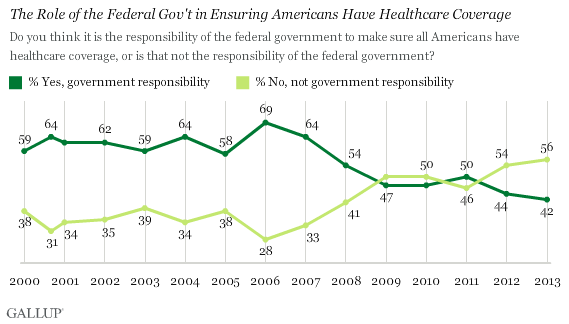
New poll numbers on Obamacare from Gallup and Quinnipiac are the latest signs that the law’s botched rollout could be the beginning of the greatest political crack-up in a generation—and an unprecedented opportunity for conservatives to offer America something better.
The Gallup poll, released yesterday, shows that a record number of Americans—56 percent—do not believe that it is the government’s responsibility to ensure that all Americans have health care. This is a dramatic shift from 2009, when a clear majority said the opposite.

The shift appears to cut across party lines. Republicans overwhelmingly (86 percent) say that health care is not the government’s job, while 55 percent of independents and 30 percent of Democrats agree. This is the largest shift among Democrats since Gallup started asking the question in 2000.
Why the drastic change in opinion? It might have something to do with the administration’s credibility. A recent Quinnipiac poll shows nearly half of American voters think the president “knowingly deceived” them when he uttered, repeatedly, those now-infamous words: “if you like your plan, you can keep it.” A majority (52 percent) don’t think Obama is honest and trustworthy, which might be why only 19 percent of voters think Obamacare will improve the quality of their health care and 43 percent say it will make health care worse.
The president’s press conference last week, in which he made a series of bizarre statements suggesting the mass cancellation of insurance plans nationwide was an unforeseen consequence of Obamacare that needs an administrative “fix,” probably did not help inspire confidence—especially since cancelling millions of plans is what the law was designed to do all along.
Among Obama’s several remarkable admissions was this, delivered without irony: “But even if we get the hardware and software working exactly the way it’s supposed to with relatively minor glitches, what we’re also discovering is that insurance is complicated to buy.”
Yes, you read that correctly. The administration has recently discovered that insurance is complicated to buy. Most Americans probably assumed that the administration knew this before it decided to disrupt health insurance markets and build a vast system for standardizing and mandating the purchase of government-approved coverage. They’re the experts, right?
At the very least, the administration has known all along that millions of people on the individual market would lose coverage as a direct result of Obamacare—and as Avik Roy points out, since at least 2010 it has known that as many as 93 million people nationwide could lose both individual and employer-based coverage. As the cancellation letters roll in, the American people are beginning to realize that this was all part of the administration’s plan, that the line about keeping your insurance if you like it was a ruse, and that the government assumed Americans would be none the wiser—hence the poll numbers from Gallup and Quinnipiac.
Like the administration, Congressional Democrats are now claiming they, too, didn’t know this would happen, and last week began to break ranks in an effort to distance themselves from Obamacare ahead of the midterm elections. Sen. Mary Landrieu’s (D-La.) bill, backed by a half-dozen other Senate Democrats, would allow people to keep their cancelled plans. (Back in 2010, a nearly identical Republican bill was opposed by every Democratic senator.)
It’s difficult to say what this means for the health care law in the short-term, but what’s clear is that the political coalition that brought Obamacare into being is dissolving as Americans lose confidence in the government’s ability to re-make and manage the health care system.
In the long-term, however, it might mean that conservatives have an opening to push for reforms that replace the Affordable Care Act with a market-driven system that addresses the systemic problems we had before Obamacare. James Capretta and Robert Moffit have outlined such a system, the main features of which have been discussed and debated for years.
But whatever the details of the plan, it is imperative that conservatives have one to offer when the time is right. Simply watching in rapturous glee as Obamacare collapses will not do. Already, the New York Times is decrying Republicans for “using the calamitous debut of the Affordable Care Act as their latest justification for undermining all of health care reform”—and as an excuse “to do nothing on immigration reform, on a budget agreement, and on any other initiative coming out of the White House.”
As public opinion turns against Obamacare—and against big government generally—conservatives can finally make the case for a health care system built on free markets and individual choice. If they don’t, they will lose an historic opportunity to capture an issue that liberals have owned for a half-century and that the spectacular failure of Obamacare has given Americans good reason to think should be left to individuals and families—far from the reach of Washington.
Mr. Davidson is a writer based in Austin, Texas, and a health care policy analyst at the Texas Public Policy Foundation.









